Sold Ceramics
Sold Batavia Brown (Capucin wares) 1700-1800
Tea, Coffee and Chocolate wares
Page 1
In the Netherlands, porcelain decorated in this type of underglaze brown has historically been called "Batavia Brown" or "Capucijnergoed" ("Chick-pea ware", after the legume). The first name may have been coined because most goods exported to The Netherlands from the East were sent via Batavia and has nothing to do with a Batavian production or decoration, It is a very common type with the decoration usually contained within medallions. Occasionally, a gold decoration has been painted on the brown glaze. The brown colour is achieved by using iron oxide as a pigment, which like underglaze blue, needs to be fired at high temperatures. Considerable quantities were exported to the Western and Inter-Asian markets from c.1700. The pieces are rarely refined and can be considered as articles for everyday use by the middle-classes. (Jörg 2002/2, p.120)
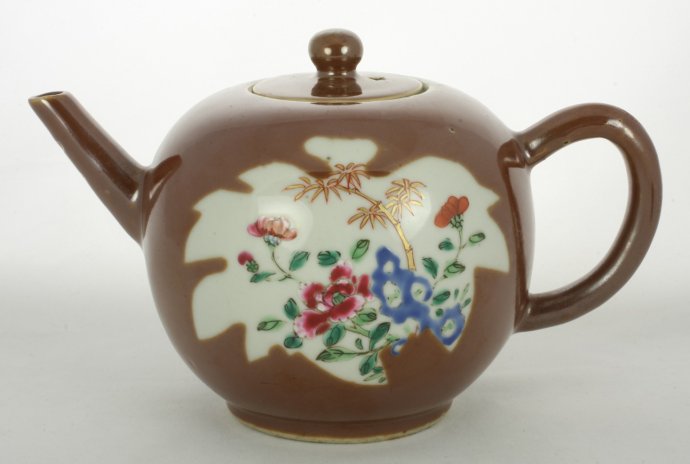
Sold Ceramics - Sold Batavia Brown (Capucin wares) 1700-1800 - Tea, Coffee and Chocolate wares - Page 1
Object 2010126
Teapot
China
1740-1750
Height with cover: 112 mm (4.41 inch), diameter handle to spout 190 mm (7.48 inch), diameter of mouthrim 55 mm (2.17 inch), diameter of footring 88 mm (3.47 inch)
Teapot of globular shape on footring, straight spout with a curved C-shaped handle. The inlaying flat cover with round knob. Batavia brown covered with underglaze dark brown. Polychrome decorated in various, famille rose, enamels, iron-red and gold. The body reserved with two large, leaf-shaped, panels filled with various flowering plants. Underneath the spout, a small leaf-shaped panel filled with a single flowering stem. On top of the knob a faded golden flower.
Porcelain decorated in this type of underglaze dark brown has historically been called "Batavia brown" or "capucijnergoed" in the Netherlands, "capucin" or "feuilles mortes" in French, or simply "brown glazed" in England and the United States. Occasionally, a gold decoration has been painted on the brown glaze. These "Batavia brown" pieces were very popular in the Netherlands and the Dutch East Indies. (Jörg & Van Campen 1997, pp.136-137 & p.211)
Condition: On the handle a missing piece of glaze, three firing flaws and a frit all to the inner mouth rim.
References:
Jacquemart & Le Blant 1862, pp.77-105
Price: Sold.
More pictures of object 2011289, another identically shaped, sized and decorated, sold teapot >>

Sold Ceramics - Sold Batavia Brown (Capucin wares) 1700-1800 - Tea, Coffee and Chocolate wares - Page 1
Object 2011126
Teacup and saucer
China
1740-1760
Height of teacup 27 mm (1.06 inch), diameter of rim 46 mm (1.81 inch), diameter of footring 20 mm (0.79 inch)
Height of saucer 16 mm (0.63 inch), diameter of rim 82 mm (3.23 inch), diameter of footring 40 mm (1.57 inch)
Teacup and saucer on footrings, slightly everted rims. Batavia Brown covered with underglaze dark brown. Both teacup and saucer are completely covered with Batavia Brown underglaze dark brown and undecorated.
The brown colour is achieved by using iron oxide as a pigment, which like underglaze blue, needs to be fired at high temperatures. Considerable quantities were exported to the Western and inter-Asian markets from c.1700. The pieces are rarely refined and can be considered as articles for everyday use by the middle-classes. (Jörg 2002/2, p.120)
For an identically shaped and decorated teacup and saucer, please see:
- Have a Cup of Tea. Chinese Porcelain and Tea in North-West Germany, (Exhibition catalogue, Isensee Verlag, Oldenburg, 2015), p.125, cat. 105 / Made in China, Porzellan und Teekultur im Nordwesten, (Exhibition catalogue, Isensee Verlag, Oldenburg, 2015), p.159, cat. 105.
Condition:
Teacup: Perfect.
Saucer: A frit to the rim.
References:
Jörg & Van Campen 1997, cat. 143 & 251
Price: Sold.
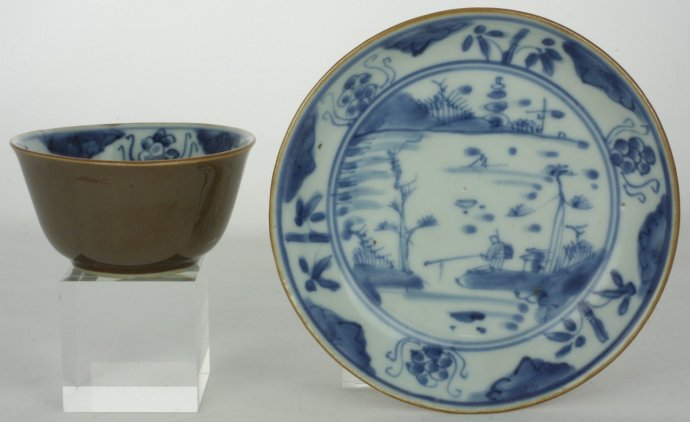
Sold Ceramics - Sold Batavia Brown (Capucin wares) 1700-1800 - Tea, Coffee and Chocolate wares - Page 1
Object 2010412
Teacup and saucer
China
1720-1730
Height of teacup 37 mm (1.46 inch), diameter of rim 75 mm (2.95 inch), diameter of footring 36 mm (1.42 inch)
Height of saucer 21 mm (0.83 inch), diameter of rim 106 mm (4.17 inch), diameter of footring 62 mm (2.44 inch)
Teacup and saucer on footrings, slightly everted rims. Batavia Brown covered with underglaze dark brown and underglaze-blue with a fisherman in a riverscape, within a border of blue-washed flowers.
Among the ceramic cargo of the Ca Mau shipwreck (1725) almost identical shaped and decorated teacups and saucers with the so-called 'Fisherman and boats passing' pattern were found. (Amsterdam 2007, pp.30-31)
Condition:
Teacup: A small firing flaw to the rim, a shallow frit and a shallow chip to the footring.
Saucer: Perfect.
References:
Price: Sold.
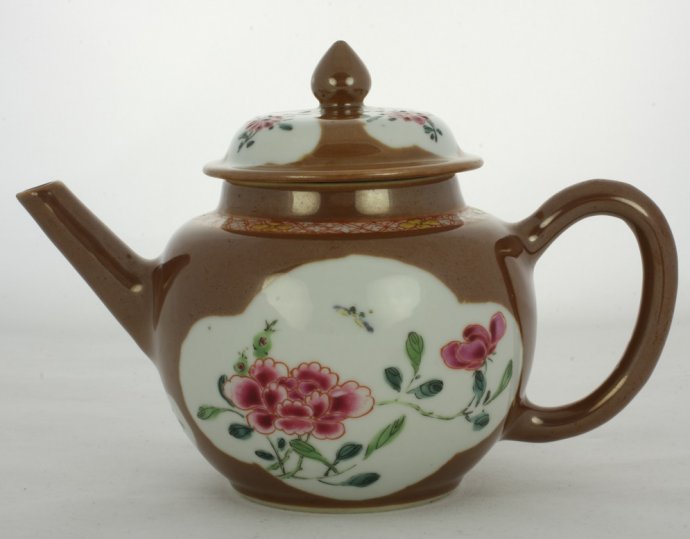
Sold Ceramics - Sold Batavia Brown (Capucin wares) 1700-1800 - Tea, Coffee and Chocolate wares - Page 1
Object 2010407
Teapot
China
1740-1760
Height with cover 117 mm (4.60 inch), diameter handle to spout 172 mm (6.77 inch), diameter of footring 56 mm (2.21 inch)
Teapot of globular shape on footring, straight spout with a curved C-shaped handle. Domed cover and pointed knob. Batavia Brown covered with underglaze dark brown. Polychrome decorated in various, famille rose, overglaze enamels and iron-red. Decorated with peony sprays, a small chrysanthemum spray and a flying insect in two large and one small reserve on the body. The cover is similarly decorated.
The term "famille rose" was first coined by the 19th-century French author Albert Jacquemart, who distinguished between specific groups in his descriptions of Oriental ceramics. (Jacquemart & Le Blant 1862, pp.77-105)
Condition: Three tiny frits, one to the tip of the spout, one to the top of the knob and one to the inner rim a fleabite to the rim of the cover.
References:
Jacquemart & Le Blant 1862, pp.77-105.
Price: Sold.
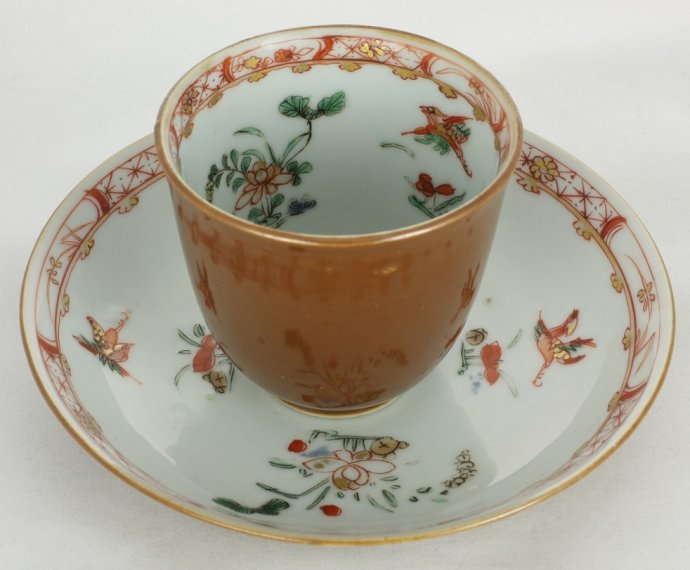
Sold Ceramics - Sold Batavia Brown (Capucin wares) 1700-1800 - Tea, Coffee and Chocolate wares - Page 1
Object 2010634B
Chocolate cup and saucer
China
1720-1740
Height of cup 60 mm (2.36 inch), diameter of rim 70 mm (2.76 inch), diameter of footring 32 mm (1.26 inch)
Height of saucer 29 mm (1.14 inch), diameter of rim 135 mm (5.32 inch), diameter of footring 74 mm (2.91 inch)
Chocolate cup and saucer on footrings, slightly everted rims. Batavia Brown covered with underglaze dark brown. Decorated in various famille verte enamels, iron-red and gold. In the centre of the saucer a single flower surrounded by flowering lotus pants and flying birds. On the rim a trellis pattern border with a single flower head and four reserves filled with a single flowering stem. On the bottom of the cup a single flower and on the rim flowering lotus pants with birds in flight. Around the rim a trellis pattern border with a single flower head and four reserves filled with a single flowering stem.
Cocoa was first brought to Europe by the Spaniards from Mexico in the 1st half of the 16th century. From Spain the cocoa beans were traded to Italy and The Netherlands. First used as a medicine, later at the end of the 17th century it was consumed as a pleasure drink. In 1722 Father d'Entrecolles already mentioned, high chocolate cups/beakers, in his letters. (Jörg & Van Campen 1997, p.116)
Condition:
Cup: A firing flaw to the exterior footring with some scratches to the glaze and a few frits to the footring.
Saucer: Loss of enamels on various spots.
References:
Jörg & Van Campen 1997, cat. 117
Price: Sold.
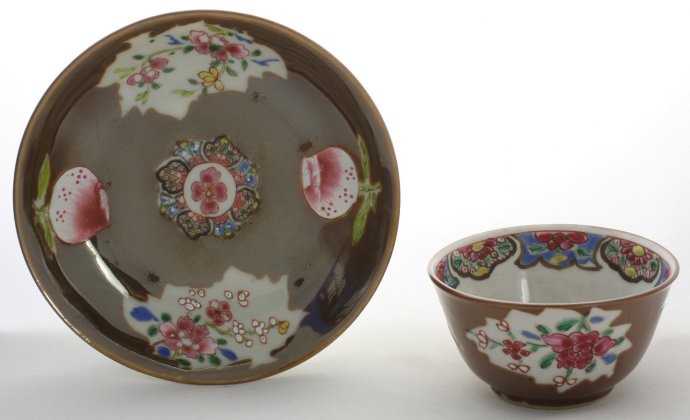
Sold Ceramics - Sold Batavia Brown (Capucin wares) 1700-1800 - Tea, Coffee and Chocolate wares - Page 1
Object 2010127D
Teacup and saucer
China
1730-1750
Height of teacup 41 mm (1,61 inch), diameter of rim 72 mm (2.84 inch), diameter of footring 35 mm (1.38 inch)
Height of saucer 22 mm (0.75 inch), diameter of rim 120 mm (3.94 inch), diameter of footring 61 mm (2.36 inch)
Teacup and saucer on footrings, slightly everted rims, the teacup with an unglazed base. Batavia Brown covered with underglaze dark brown. Polychrome decorated in various, famille rose, overglaze enamels. In the centre of the saucer a single flowering peony spray surrounded by four small pomegranate-shaped panels and four small peony-shaped panels all filled with flowers. On the rim two peaches and two pendent leaf-shaped panels filled with flowering peony and chrysanthemum sprays. The reverse is undecorated. On the sides of the teacup has a similar decoration of two peaches and two pendent leaf-shaped panels filled with flowering peony and chrysanthemum sprays. On the rim four pomegranate-shaped and four peony-shaped panels filled with flowering peony flower heads. On the bottom a flowering peony spray in a single circle.
Batavia Brown is known in China as shanyu huang (eel yellow) or shan yu pi (eel-skin), that belongs to the family of tea-dust glazes (chayemo). (Sargent 2012, p. 533)
Condition:
Teacup: Perfect.
Saucer: Perfect.
References:
Jacquemart & Le Blant 1862, pp.77-105
Price: Sold.

Sold Ceramics - Sold Batavia Brown (Capucin wares) 1700-1800 - Tea, Coffee and Chocolate wares - Page 1
Object 2010327
Teapot
China
1730-1750
Height with cover 130 mm (5.11 inch), diameter handle to spout 177 mm (6.97 inch), diameter of footring 58 mm (2.28 inch)
Teapot of globular shape on footring, straight spout with a curved C-shaped handle. Domed cover with a pointed knob. Batavia Brown covered with underglaze dark brown. Chinese Imari, decorated in underglaze blue and overglaze iron-red and gold. Decorated with faded floral gilding and two leaf-shaped reserves filled with "Long Eliza" figures in a fenced garden. On the cover four leaf-shaped reserves filled with flowering plants.
This decoration shows one of the most popular motifs of that time, the slender Chinese woman, holding a flower. In Dutch she was called a Lange Lijs, which became "Long Eliza" in English. (Jörg & Van Campen 1997, p.101)
Condition: A tiny restored piece on the finial.
References:
Jörg & Van Campen 1997, cat. 91
Price: Sold.

Sold Ceramics - Sold Batavia Brown (Capucin wares) 1700-1800 - Tea, Coffee and Chocolate wares- Page 1
Object 2010100I
Saucer
China
1730-1750
Height 21 mm (0.82 inch), diameter of rim 117 mm (4.60 inch), diameter of footring 61 mm (2.40 inch)
Saucer on a footring, slightly everted rim. Batavia Brown covered with underglaze dark brown. Chinese Imari, decorated in underglaze blue and overglaze iron-red and gold with four ducks, on in flight and three ducks are walking near / through shore vegetation. The reverse is undecorated.
Condition: Perfect.
Reference:
Price: Sold.


 create websites
create websites